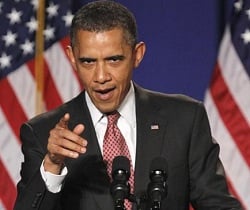Shifting red lines in Syria undermines the tough rhetoric toward Tehran
 Many observers have connected the civil war raging in Syria to the broader U.S. standoff with Iran. Critics of the Obama administration’s extremely cautious approach on Syria argue that pushing more forcefully for the demise of Bashar al-Assad’s regime, Tehran’s main ally in the Arab world, would bring about Iran’s further strategic isolation. But another link is less noticed: Washington’s shifting red lines on Assad’s use of chemical weapons is undermining President Obama’s tough talk on Iran’s nuclear ambitions.
Many observers have connected the civil war raging in Syria to the broader U.S. standoff with Iran. Critics of the Obama administration’s extremely cautious approach on Syria argue that pushing more forcefully for the demise of Bashar al-Assad’s regime, Tehran’s main ally in the Arab world, would bring about Iran’s further strategic isolation. But another link is less noticed: Washington’s shifting red lines on Assad’s use of chemical weapons is undermining President Obama’s tough talk on Iran’s nuclear ambitions.
In earlier posts (here and here), I argued that Mr. Obama is more likely to accept a nuclear-armed Iran as a fait accompli rather than make good on his repeated vows to use military force to prevent it. My reasoning is two-fold: First, as the depressing track record with North Korea over the last two decades demonstrates, it is exceedingly difficult for Washington to stop a rogue regime determined to develop nuclear weapon capabilities.
A second reason is more specific to this White House: The Obama administration’s threat to pick up the cudgel of military action has always an air of unreality. After all, as I wrote earlier, “a president determined to wind down George Bush’s wars in the Greater Middle East is quite unlikely to initiate a third one.”
A chorus of Middle East experts, as quoted a few days ago in The Times of Israel, insists that I have it wrong. Dennis Ross, who oversaw White House policy toward Tehran for a good part of Mr. Obama’s first term, comments that “I think there’s the stomach in this administration, and this president, that if diplomacy fails [to deter Iran from developing nuclear weapons] — to use force.” Elliott Abrams, a former deputy national security advisor to President George W. Bush and now a senior fellow at the Council on Foreign Relations, concurs. And the same goes for James F. Jeffrey, who oversaw Iran policy in the Bush White House before serving as the immediate past U.S. ambassador in Baghdad.
But others are starting to weigh in on my side of the argument. John Vinocur, a senior correspondent at the International Herald Tribune, last week questioned Mr. Obama’s resolve on the Iranian nuclear program. He also points to an interview Gideon Rose, the editor of Foreign Affairs, gave to National Public Radio last month. In it, Rose refers to the edifying Bush record vis-a vis Pyongyang:
[T]he interesting question will be, if push comes to shove and the Iranians do move forward, will [Obama] actually live up to that pledge or will he do what George W. Bush did on North Korea, which is sort of conveniently forget that we actually were opposed to North Korea going nuclear and just rely back on deterrence and containment?
I think what they’re going to try to do is keep the can being kicked down the road for as long as possible because no one really wants to face that choice.
An additional reason for doubting Washington’s resolve emerged with last week’s reports (here, here and here) that the increasingly desperate Assad regime is preparing to use its chemical weapons arsenal, the third largest in the world, against advancing rebel forces. This is a contingency that Mr. Obama explicitly warned against just four months ago. Speaking at a press gathering last August, he declared that “a red line for us is we start seeing a whole bunch of chemical weapons moving around or being utilized. That would change my calculus. That would change my equation. . . . We’re monitoring that situation very carefully. We have put together a range of contingency plans.”
But as the New York Times reports, Mr. Obama’s “red line” is now shifting:
His warning against “moving” weapons has disappeared from his public pronouncements, as well as those of Secretary of State Hillary Rodham Clinton. The new warning is that if Mr. Assad makes use of those weapons, presumably against his own people or his neighbors, he will face unspecified consequences.
According to the newspaper, an administration official acknowledges that “We’re kind of boxed in. There’s an issue of presidential credibility here. But our [military] options are quite limited.” Peter D. Feaver, who served on the National Security Council staff during the Bush and Clinton years, reviews these options in a post today on the Foreign Policy website. He likewise concludes that Assad doesn’t have much to fear from Washington’s threats.
The Syrian example holds two points relevant to U.S. policy toward Iran. The first is the difficulty of enforcing red lines that are imposed on rogue regimes and their weapons of mass destruction. The second is that shifting lines in the sand do not escape notice. Mr. Obama should thus not be surprised if officials in Tehran, interpreting the events that transpired in the last few days, discount even further the tough words he regularly directs their way.
This commentary was originally posted on Monsters Abroad. I invite you to connect with me via Facebook and Twitter.